-
ORIGINAL ARTICLE11-29-2022
Outlining the therapeutic itineraries of children with disabilities in the professional health care subsystem
Revista Brasileira de Enfermagem. 2022;75(3):e20210169
Abstract
ORIGINAL ARTICLEOutlining the therapeutic itineraries of children with disabilities in the professional health care subsystem
Revista Brasileira de Enfermagem. 2022;75(3):e20210169
DOI 10.1590/0034-7167-2021-0169
Views0See moreABSTRACT
Objectives:
to identify the outlining of therapeutic itineraries of families of children with disabilities in the professional health care subsystem.
Methods:
qualitative research carried out in two specialized services in the state of Ceará, with 41 family members interviewed using the life path technique and reports submitted to descending hierarchical classification and similitude analysis, with the help of the IRaMuTeQ software and the theoretical framework of health care systems.
Results:
the classes described the families’ itineraries in five paths, related to faith, support structures, medical behaviors, professionals, and health services. The professional subsystem stood out as deficient in outlining the therapeutic itinerary for access to health care for children with disabilities, without promoting integration between services in the Care Network.
Final considerations:
the families’ therapeutic itineraries showed homogeneous discourse with themes related to the care of professionals and spiritual aspects.
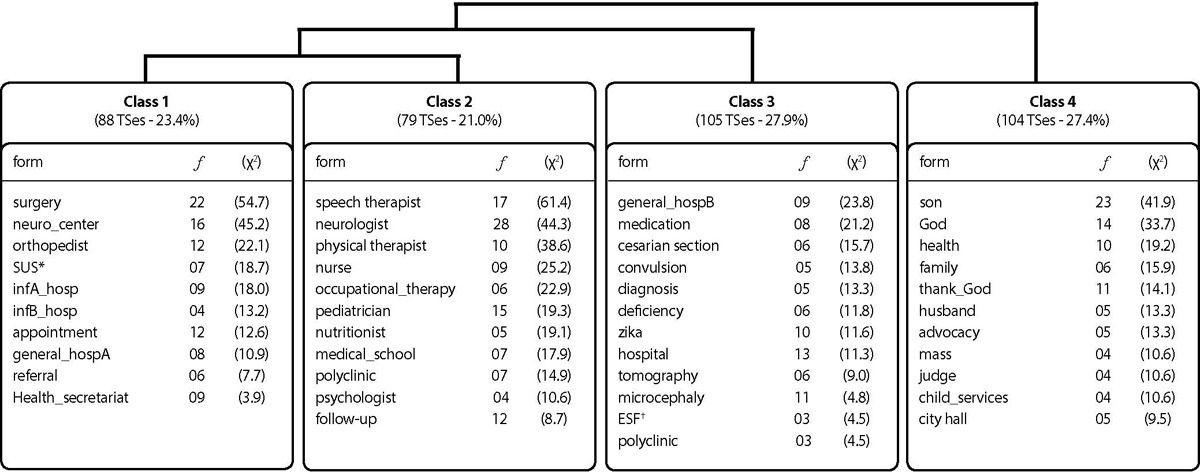
-
ORIGINAL ARTICLE11-29-2022
Undernutrition and associated factors in primary schoolchildren in Lokossa, Benin: a cross-sectional study
Revista Brasileira de Enfermagem. 2022;75(3):e20210254
Abstract
ORIGINAL ARTICLEUndernutrition and associated factors in primary schoolchildren in Lokossa, Benin: a cross-sectional study
Revista Brasileira de Enfermagem. 2022;75(3):e20210254
DOI 10.1590/0034-7167-2021-0254
Views1See moreABSTRACT
Objectives:
to estimate the prevalence of stunting and thinness and sociodemographic, household, family, dietary, and scholar associated factors in schoolchildren living in Lokossa-Benin.
Methods:
a survey conducted in a probabilistic sample (n=615) of primary schoolchildren (8-17 years), from 12/2018 to 01/2019, using structured questionnaire and 24-hour dietary recall. Thinness and stunting were defined as Height-for-age and Body Mass Index-for-age below-2 standard deviations, respectively. Associations were estimated by chi-square test and logistic regression.
Results:
thinness and stunting prevalence was 13.1% (95%CI:9.0-18.7) and 25.5% (95%CI:20.6-31.2), respectively. Odds of thinness were higher among older schoolchildren and those who experienced hunger at school. Odds of stunting increased with age, low diet diversity, experiencing hunger at school, and having school meal five days a week (OR:2.09; 95%CI:1.29-3.36).
Conclusions:
stunting was the most common problem. Older schoolchildren and those with food deprivation or poor diet diversity were the most affected.
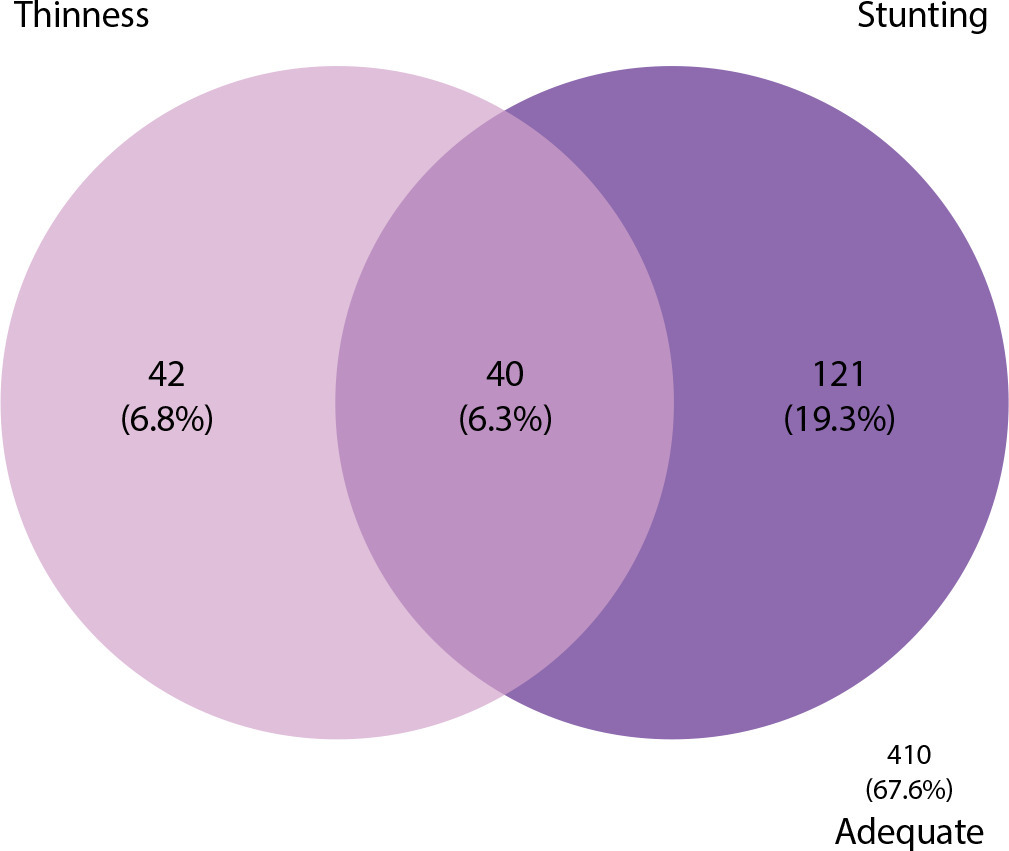
-
ORIGINAL ARTICLE11-29-2022
Factors associated with bronchopulmonary aspiration: a national-based study
Revista Brasileira de Enfermagem. 2022;75(3):e20210220
Abstract
ORIGINAL ARTICLEFactors associated with bronchopulmonary aspiration: a national-based study
Revista Brasileira de Enfermagem. 2022;75(3):e20210220
DOI 10.1590/0034-7167-2021-0220
Views0See moreABSTRACT
Objectives:
to determine the prevalence of bronchopulmonary aspiration in the Brazilian scenario, the factors associated with the incident and the variables associated with death.
Methods:
a cross-sectional and analytical study, carried out from analysis of notifications of incidents related to bronchopulmonary aspiration of the Health Surveillance Notification System, from January 2014 to December 2018.
Results:
of the 264,590 notifications, 553 referred to aspiration, whose prevalence rate was 0.21%. There was an association between the event and age, ethnicity, main medical diagnosis, country region, service type, health unit and consequences for patients. Furthermore, four independent predictor variables for death were found: living in the North or South regions, being elderly and receiving healthcare at night.
Conclusions:
the prevalence rate of bronchopulmonary aspiration was small, but with a negative impact on patients.
-
ORIGINAL ARTICLE11-29-2022
Professional burnout of nursing team working to fight the new coronavirus pandemic
Revista Brasileira de Enfermagem. 2022;75:e20210498
Abstract
ORIGINAL ARTICLEProfessional burnout of nursing team working to fight the new coronavirus pandemic
Revista Brasileira de Enfermagem. 2022;75:e20210498
DOI 10.1590/0034-7167-2021-0498
Views0See moreABSTRACT
Objective:
to identify burnout and associated factors among nursing workers working in coping with COVID-19.
Methods:
a cross-sectional study, developed in four hospitals in a capital in southern Brazil. Sample (n=499) composed of nurses and nursing technicians/assistants, who answered an online form containing socio-occupational characterization and the Maslach Burnout Inventory. Descriptive and inferential statistical analysis was performed, including multiple comparison tests.
Results:
burnout was identified in 60 (12%) workers, with no significant difference between hospitals, but with a difference in dimensions between them. In the emotional exhaustion dimension, a higher proportion (52.9%) was found at a moderate level. Prevalence of high level of professional achievement of 95.4% was identified.
Conclusion:
the presence of burnout was significantly prevalent among nurses and females. It reinforces the need to develop strategies to promote the health of nursing workers, providing improvement in health services and reduction of care and labor risks.
-
ORIGINAL ARTICLE11-29-2022
Changes implemented in the work environment of nurses in the COVID-19 pandemic
Revista Brasileira de Enfermagem. 2022;75:e20201381
Abstract
ORIGINAL ARTICLEChanges implemented in the work environment of nurses in the COVID-19 pandemic
Revista Brasileira de Enfermagem. 2022;75:e20201381
DOI 10.1590/0034-7167-2020-1381
Views0See moreABSTRACT
Objective:
to describe the changes implemented in the work environment of nurses in university hospitals considering the COVID-19 pandemic.
Methods:
this qualitative and descriptive research was developed from an online survey with 75 nurses from three Brazilian university hospitals. Data processing occurred through textual analysis with the aid of software IRAMUTEQ.
Results:
five semantic classes were obtained: Organization of units for exclusive care of patients with COVID-19; Adaptations in the use of personal protective equipment; Physical structure adaptation; Care flow institution; Increased number of beds and training courses. Final considerations: the results show the effort of healthcare and nursing professionals/managers in the development of structural adaptations and reorganizations of care processes, in the hospital context, to respond with quality and efficiency to the demands arising from the COVID-19 pandemic.
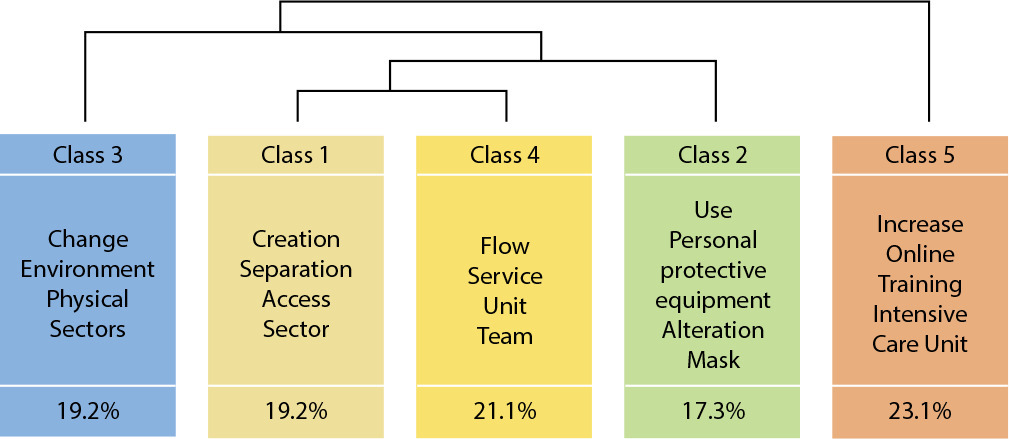
-
EXPERIENCE REPORT11-29-2022
Virtualization of the Brazilian Nursing Week in the COVID-19 pandemic: the novelty and the tangible
Revista Brasileira de Enfermagem. 2022;75:e20201203
Abstract
EXPERIENCE REPORTVirtualization of the Brazilian Nursing Week in the COVID-19 pandemic: the novelty and the tangible
Revista Brasileira de Enfermagem. 2022;75:e20201203
DOI 10.1590/0034-7167-2020-1203
Views0See moreABSTRACT
Objective:
to report the virtualization experience of the 81st Brazilian Nursing Week of a public university in the state of Rio de Janeiro.
Methods:
an experience report with descriptive approach on the planning and virtual operationalization of a traditional nursing event, which took place in May 2020.
Results:
the event had 543 entries and 39 activities were offered, 3 panels with the presence of international guests, 1 national conference, 3 thematic roundtable discussions, 9 roundtable discussions involving projects and extension leagues, 5 cultural activities and 17 activities in social networks (lives and videos). Final considerations: the virtualization of the 81st Brazilian Nursing Week brought the learning and appropriation of new ways of debating nursing in times of physical isolation, which will contribute to an immediate future in social and work relations as well as to the collaborative construction of knowledge.
-
ORIGINAL ARTICLE11-29-2022
Reflections on nursing and COVID-19 in light of health education
Revista Brasileira de Enfermagem. 2022;75:e20201305
Abstract
ORIGINAL ARTICLEReflections on nursing and COVID-19 in light of health education
Revista Brasileira de Enfermagem. 2022;75:e20201305
DOI 10.1590/0034-7167-2020-1305
Views0See moreABSTRACT
Objective:
To reflect on the nursing and pandemic of COVID-19 considering health education, health promotion, and the Ottawa Charter action areas.
Methods:
A theoretical-reflexive study on health education and health promotion concepts and the areas of action presented in the Ottawa Charter.
Results:
Educational actions are present in the contexts of epidemics and pandemics, as well as in the work of nurses, who need to be increasingly based on dialogue and individual and collective empowerment to enable users to adopt healthy and preventive behaviors – in this case, concerning COVID19. However, this professional needs effective and efficient public policy actions and measures based on scientific assumptions of health promotion. Final considerations: The actions of health education need to be increasingly valued because knowledge can be considered the first “vaccine” to combat any pandemic.

-
ORIGINAL ARTICLE11-26-2022
Factors associated with suicide ideation of healthcare university students
Revista Brasileira de Enfermagem. 2022;75:e20200982
Abstract
ORIGINAL ARTICLEFactors associated with suicide ideation of healthcare university students
Revista Brasileira de Enfermagem. 2022;75:e20200982
DOI 10.1590/0034-7167-2020-0982
Views0See moreABSTRACT
Objectives:
to analyze the factors associated with suicidal ideation in students from healthcare graduation courses.
Methods:
quantitative, cross-sectional study, with 251 students from the courses of radiology, speech-language therapy, medicine, nutrition, health service management, and nursing, from a federal higher education institution in the Southeast of Brazil. Data were collected from August to October 2019, using an electronic questionnaire.
Results:
the prevalence of suicidal ideation among participants was 26.33%. In the final logistic regression model, only depressive symptoms were associated with suicidal ideation. Having symptoms of depression increased the chances of suicidal ideation 2.6 times.
Conclusion:
the high prevalence of suicidal ideation and its associated factors constitutes a situational diagnosis that demands the elaboration of public and institutional policies, focused on the promotion and attention to the mental health of the students.
-
ORIGINAL ARTICLE09-09-2022
Palliative care management by caregivers in home care: theoretical validation in a conversation circle
Revista Brasileira de Enfermagem. 2022;75(6):e20210737
Abstract
ORIGINAL ARTICLEPalliative care management by caregivers in home care: theoretical validation in a conversation circle
Revista Brasileira de Enfermagem. 2022;75(6):e20210737
DOI 10.1590/0034-7167-2021-0737
Views0See moreABSTRACT
Objectives:
to present the validation process of a Grounded Theory on the management of palliative care at home by a caregiver of a family member who experiences a death/dying process.
Methods:
a qualitative, explanatory research, which validated a theoretical matrix through a conversation circle containing 15 family caregivers and nine healthcare professionals, in December 2018.
Results:
forty-six propositions were validated regarding family caregivers’ contextual, causal, intervening conditions, consequences and action strategies to deal with the dying and death process of a family member. Conversation circles encouraged dialogue and (re)signification of the senses and knowledge of those involved, proving to be a way of educating and promoting the exercise of citizenship by participants.
Final Considerations:
the conversation circle made it possible for participants to interact and share information and experiences regarding home care for palliative patients and their families.

-
EXPERIENCE REPORT06-24-2022
Step-by-step approach to reopening a Brazilian higher education institution during the COVID-19 pandemic
Revista Brasileira de Enfermagem. 2022;75(6):e20210807
Abstract
EXPERIENCE REPORTStep-by-step approach to reopening a Brazilian higher education institution during the COVID-19 pandemic
Revista Brasileira de Enfermagem. 2022;75(6):e20210807
DOI 10.1590/0034-7167-2021-0807
Views0See moreABSTRACT
Objectives:
to describe the experience of reopening a Brazilian higher education institution during the COVID-19 pandemic.
Methods:
experience report of a step-by-set approach to reopening a nursing higher education institution in São Paulo, Brazil, from May 2020 to May 2021.
Results:
the plan was created and operated by a group including students, professors, and technical-administrative workers. Weekly or by-weekly meetings occurred according to changes in the epidemiological situation and the needs to review the local technical and political agreements.
Conclusions:
we suggest that reopening plans during the COVID-19 pandemic should be politically and technically legitimated by all members of the community of a higher education institution so that they can take place quickly and sustainably. The early identification of COVID-19 cases and the adoption of local administrative measures are necessary to reduce the risk of outbreaks.

-
ORIGINAL ARTICLE10-03-2022
Instrument validity: HIV and other sexually transmitted infections in homeless people
Revista Brasileira de Enfermagem. 2022;75(6):e20210863
Abstract
ORIGINAL ARTICLEInstrument validity: HIV and other sexually transmitted infections in homeless people
Revista Brasileira de Enfermagem. 2022;75(6):e20210863
DOI 10.1590/0034-7167-2021-0863
Views0See moreABSTRACT
Objectives:
to validate, through the Item Response Theory, an instrument on vulnerability to HIV and other sexually transmitted infections in homeless people.
Methods:
a cross-sectional study carried out between February and May 2018 with 100 homeless people in a municipality in northeastern Brazil. A sociodemographic questionnaire was applied, and another with items referring to behaviors vulnerable to HIV and sexually transmitted infections (STIs). Subsequently, it was assessed through the Item Response Theory.
Results:
the items previous diagnosis of STIs (F=0.473), partner with STI symptoms (F=0.518), drug use (F=0.509), sex for money (F=0.552), STI symptoms (F=0.448), number of sexual partners (F=0.616), sharps sharing (F=0.398) and being a victim of sexual violence (F=0.347) were validated.
Conclusions:
the instrument proved to be validated, being able to identify vulnerability to HIV and other sexually transmitted infections in homeless people.

-
ORIGINAL ARTICLE08-22-2022
Temporal trend of accidents due to percutaneous exposure in a public hospital in Brazil, 2007-2019
Revista Brasileira de Enfermagem. 2022;75(6):e20220046
Abstract
ORIGINAL ARTICLETemporal trend of accidents due to percutaneous exposure in a public hospital in Brazil, 2007-2019
Revista Brasileira de Enfermagem. 2022;75(6):e20220046
DOI 10.1590/0034-7167-2022-0046
Views0See moreABSTRACT
Objectives:
to analyze the temporal trend of accidents due to percutaneous exposure in a public hospital in Brazil, between 2007 and 2019, according to sociodemographic and professional characteristics.
Methods:
analysis of time series of accidents due to percutaneous exposure that occurred in health workers. Sociodemographic and professional variables, accident profile, post-accident behavior and accident incidence rates were evaluated. The Prais Winsten regression was used for trend analysis and calculation of the annual percentage change, with a significance level of 5%.
Results:
761 occupational accidents were recorded. There was a downward trend in the rate of percutaneous injuries among female workers (-0.012%; p=0.009), who had secondary education (-0.011%; p=0.035) and among all health professional categories (-0.010%; p =0.019). There was an increasing trend (0.018%; p= 0.050) among workers with ≥ 61 months of professional experience.
Conclusions:
the analysis showed a decreasing incidence of percutaneous accidents, which can be explained by multiple factors.

-
ORIGINAL ARTICLE11-26-2022
Health beliefs and adherence of the elderly to fall prevention measures: a quasi-experimental study
Revista Brasileira de Enfermagem. 2022;75:e20201190
Abstract
ORIGINAL ARTICLEHealth beliefs and adherence of the elderly to fall prevention measures: a quasi-experimental study
Revista Brasileira de Enfermagem. 2022;75:e20201190
DOI 10.1590/0034-7167-2020-1190
Views0See moreABSTRACT
Objective:
To evaluate the effect of an educational intervention on health beliefs and adherence of elderly people to fall prevention measures.
Methods:
This is a quasi-experimental study, carried out at the Senior Citizens’ Center. Sixty-eight elderly completed the intervention. The intervention consisted of four meetings focused on beliefs about falls and prevention, and the evaluation occurred at baseline and 30 days after completion.
Results:
The elderly were predominantly women (83.82%), with one to four years of schooling (36.76%), with health problems (95.59%), and 48.53% had fallen. There was a significant increase in perceived susceptibility, severity, benefits, barriers, and total health belief score post educational intervention. By adding total to partial adherence, there was a significant increase in the adherence of the elderly to fall prevention measures after the educational intervention.
Conclusion:
Educational intervention was able to improve the beliefs and adherence of the elderly to fall prevention measures.
-
ORIGINAL ARTICLE11-26-2022
Transitional care of nurses to older adults with artificial pacemaker
Revista Brasileira de Enfermagem. 2022;75:e20210192
Abstract
ORIGINAL ARTICLETransitional care of nurses to older adults with artificial pacemaker
Revista Brasileira de Enfermagem. 2022;75:e20210192
DOI 10.1590/0034-7167-2021-0192
Views0See moreABSTRACT
Objective:
to understand how the transitional care of nurses to olde adults with artificial pacemaker occurs.
Method:
a qualitative research, carried out in a philanthropic hospital in the city of Salvador, Bahia, Brazil. Fourteen nurses working in surgical and cardiac inpatient units participated. Data were collected between August and November 2020, through semi-structured interviews, and analyzed using the methodological framework Discourse of the Collective Subject and discussed in the light of Afaf Meleis’ theory of transitions.
Results:
nurses’ incipient knowledge about transitional care was identified. It was observed that the nursing discharge report is a facilitating instrument for transitional care.
Final considerations:
the study pointed out that the transitional care of nurses to older adults with artificial pacemakers does not have a theoretical foundation, reporting as a priority the care with the pacemaker identification card and with the surgical wound.
-
REVIEW02-25-2022
COVID-19 and the occupational stress experienced by health professionals in the hospital context: integrative review
Revista Brasileira de Enfermagem. 2022;75:e20200859
Abstract
REVIEWCOVID-19 and the occupational stress experienced by health professionals in the hospital context: integrative review
Revista Brasileira de Enfermagem. 2022;75:e20200859
DOI 10.1590/0034-7167-2020-0859
Views1See moreABSTRACT
Objective:
To analyze Brazilian and international scientific publications about the stress experienced by health professionals in the hospital context during the COVID-19 pandemic.
Methods:
Integrative literature review carried out on the SciELO, ScienceDirect, and LILACS databases, and sources of official Brazilian institutions, with documents published by May 2020.
Results:
Of the 26 selected references, 19 (73.08%) were indexed articles, and 7 (26.92 %) were obtained from official institutions. The study found that stress is mainly due to the overload of hospital services, the removal of professionals, the insufficiency of personal protective equipment and strict biosecurity measures, challenges in the allocation of available resources, and the risk of contamination by COVID-19.
Final considerations:
The stress experienced by health professionals in hospital institutions during the pandemic can trigger occupational and psychological problems.

-
ORIGINAL ARTICLE09-29-2022
Neither angels nor heroes: nurse speeches during the COVID-19 pandemic from a Foucauldian perspective
Revista Brasileira de Enfermagem. 2022;75:e20201329
Abstract
ORIGINAL ARTICLENeither angels nor heroes: nurse speeches during the COVID-19 pandemic from a Foucauldian perspective
Revista Brasileira de Enfermagem. 2022;75:e20201329
DOI 10.1590/0034-7167-2020-1329
Views1See moreABSTRACT
Objective:
to analyze the processes of meaning production, based on the speeches of nursing professionals, about how they feel about the titles of “angels and heroes” given by society during the pandemic of COVID-19.
Methods:
a qualitative, documentary research. Data was collected in October and November 2020 and analyzed from the perspective of the Discourse Analysis proposed by Michel Foucault.
Results:
they were organized into two thematic categories: “Angels and heroes? The (not) heroic reality of nursing during the pandemic” and “The search for recognition of the professional work of nursing: between what is said and what is not said”.
Final considerations:
the nurses’ speeches enunciate the search for decent conditions for the execution of care, fair wages, and recognition of the professional work by society.
-
08-19-2019
Humor intervention in the nurse-patient interaction
Revista Brasileira de Enfermagem. 2019;72(4):1078-1085
Abstract
Humor intervention in the nurse-patient interaction
Revista Brasileira de Enfermagem. 2019;72(4):1078-1085
DOI 10.1590/0034-7167-2018-0609
Views0ABSTRACT
Objective:
To describe the factors influencing the use of humor in nursing care, its applicability and benefits.
Method:
A scoping review was performed using the Arksey and O’Mally methodology. A search for articles published between 2008 and 2018 was performed using the platforms EBSCO Host, Virtual Health Library and Google Scholar.
Results:
From the initial 465 articles found, 17 were included for final revision. Data allowed to retrieve information on humor definition; its applicability as a nursing intervention; humor as a tool to improve nurse-patient communication and relationship; influence factors; type of humor interventions; humor benefits in health care context and; limitations and precautions of humor intervention.
Conclusion:
The use of humor promotes both communication and human interaction; it promotes well-being; helps deal/cope with difficult and unpleasant situations, reduces tension, discomfort and stress; and strengthens the immune system. This intervention should be used with caution.
Keywords:CommunicationNurse-Patient RelationsNursingPatient Outcome AssessmentWit and Humor as SubjectSee more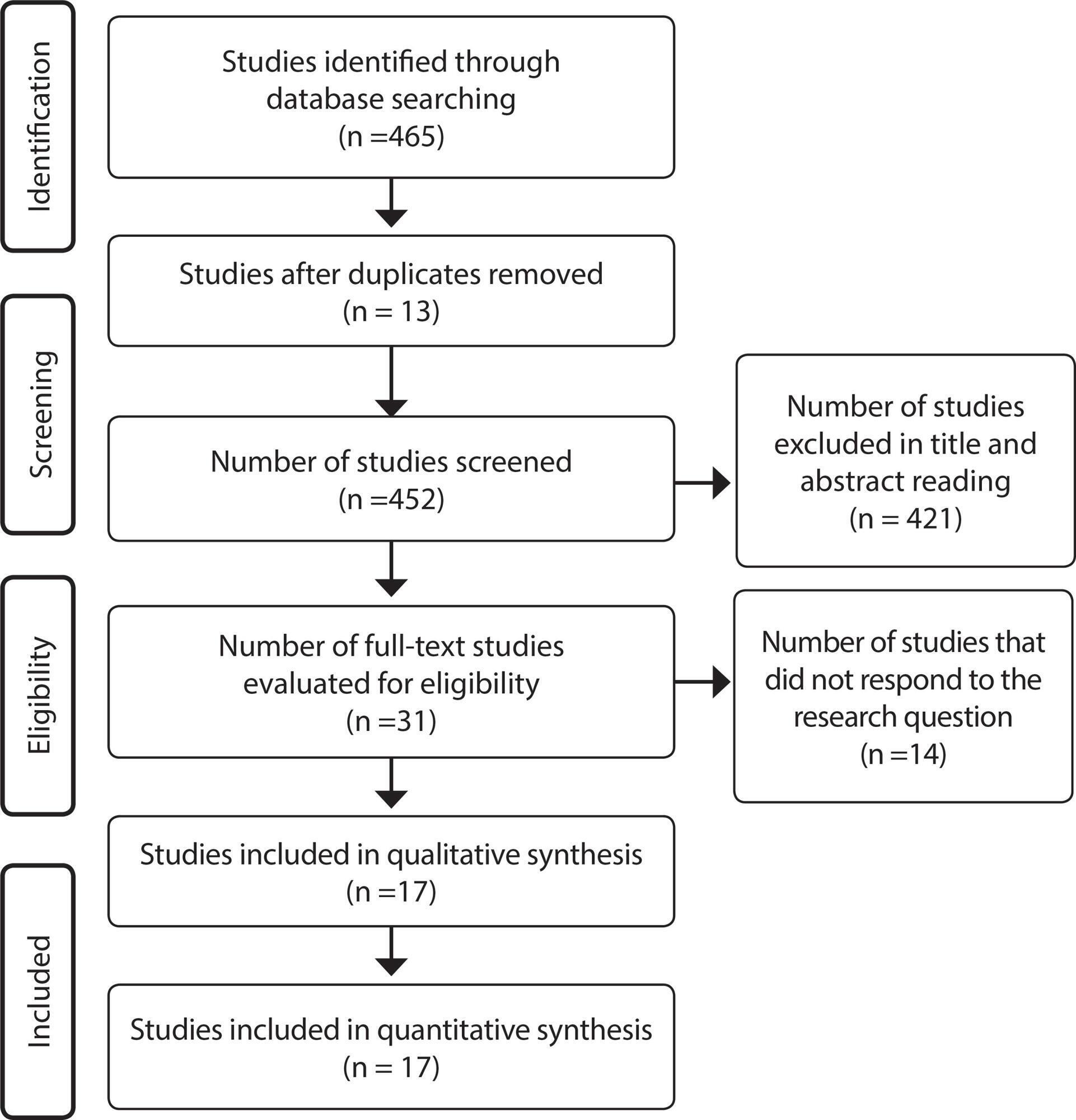
-
ORIGINAL ARTICLE10-21-2019
Workloads and burnout of nursing workers
Revista Brasileira de Enfermagem. 2019;72(6):1435-1441
Abstract
ORIGINAL ARTICLEWorkloads and burnout of nursing workers
Revista Brasileira de Enfermagem. 2019;72(6):1435-1441
DOI 10.1590/0034-7167-2017-0659
Views0See moreABSTRACT
Objective:
to identify workloads in nursing work and its association with nursing worker burnout.
Method:
a cross-sectional study, including 211 nursing workers from a university hospital, between July and August 2016. For the analysis, the descriptive statistics, Chi-Square Test, Fisher’s Exact Test and Mann Whitney U-Test were used.
Results:
the most evidenced loads were biological. A significant association was found between workloads and workers’ occupation, as well as a significant association between workloads and worker burnout. Burnout caused upper limb pain, neck and lumbar pain, lower limb pain, muscle spasm, lower limb edema, mental fatigue, headache, nervousness, and forgetfulness.
Conclusion:
workloads identification is a subsidy for the promotion of interventions that minimize the burnout generated to the health of the nursing worker.
-
REVIEW12-05-2019
Vulnerability of the elderly: a conceptual analysis
Revista Brasileira de Enfermagem. 2019;72:337-344
Abstract
REVIEWVulnerability of the elderly: a conceptual analysis
Revista Brasileira de Enfermagem. 2019;72:337-344
DOI 10.1590/0034-7167-2018-0728
Views0See moreABSTRACT
Objective:
To analyze the concept of vulnerability of the elderly.
Method:
A concept analysis, according to the method proposed by Walker and Avant, operationalized through integrative review through search in scientific data portals using the
Descriptors:
Health vulnerability, aged, health services for the aged, health of the elderly, vulnerable populations and geriatric health services. To compose the literary corpus, 36 studies were selected.
Results:
Concept antecedents, as well as its attributes, were identified in individual, social and programmatic characteristics, which make up the characteristics of “vulnerability of the elderly”, besides consequences of the phenomenon. These characteristics were analyzed with emphasis on aspects that contribute to the process of vulnerability of the elderly.
Conclusion:
The study demonstrated the multidimensionality of the phenomena studied, highlighting the peculiarities of vulnerability during aging. However, there is a need for further studies on the construct.
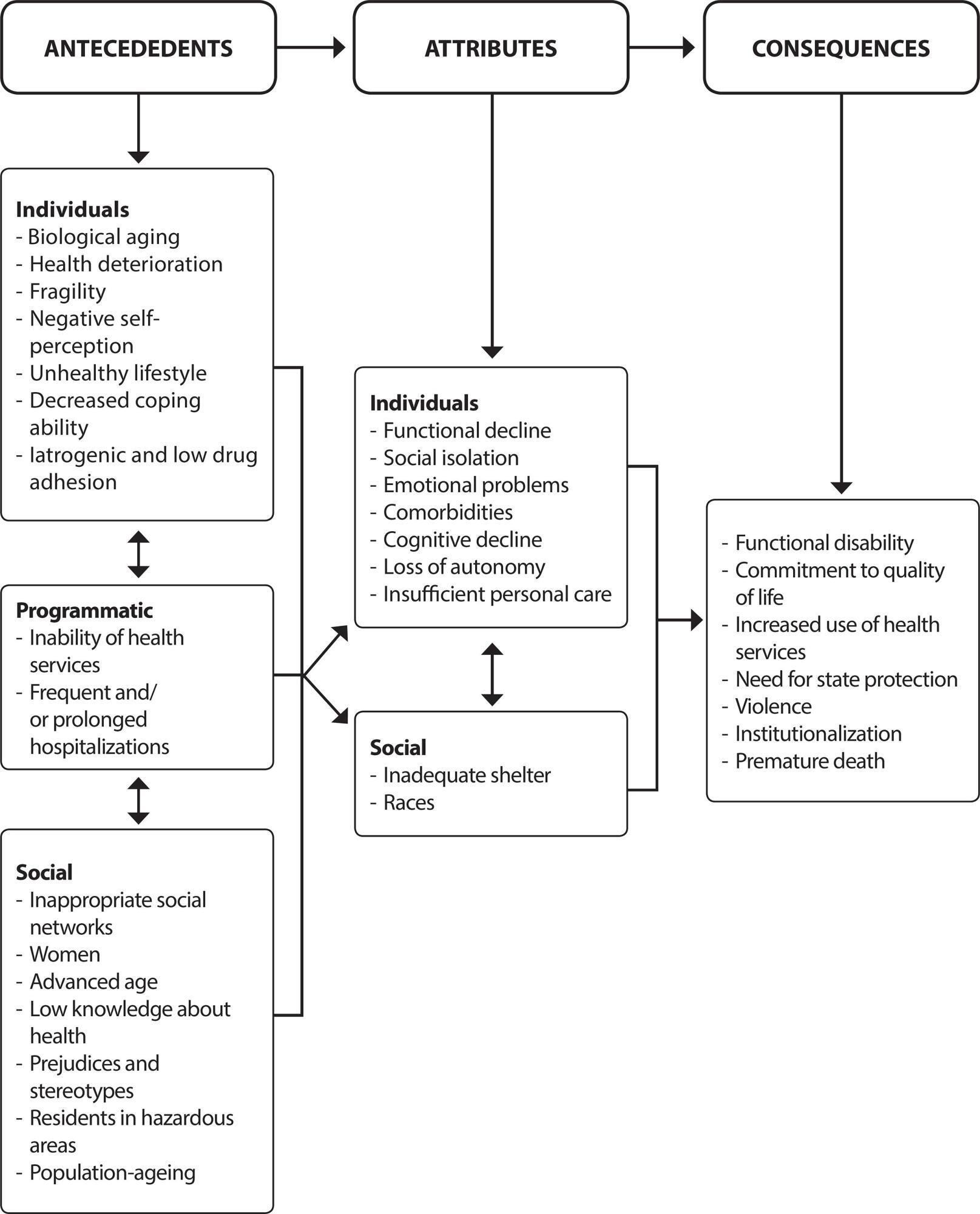
-
ORIGINAL ARTICLE10-21-2019
Nursing care systematization: perceptions and knowledge of the Brazilian nursing
Revista Brasileira de Enfermagem. 2019;72(6):1547-1553
Abstract
ORIGINAL ARTICLENursing care systematization: perceptions and knowledge of the Brazilian nursing
Revista Brasileira de Enfermagem. 2019;72(6):1547-1553
DOI 10.1590/0034-7167-2018-0606
Views0See moreABSTRACT
Objective:
to present the perception and knowledge of Brazilian nursing nurses and academics regarding Nursing Care Systematization.
Method:
a descriptive study, carried out in the first half of 2018.
Results:
of the 596 respondents, 86% perceived Nursing Care Systematization as very important, but only 60.9% used it in their care practice. Its use was statistically associated with a higher level of training. Non-utilization was associated with the perception that it is irrelevant and with little knowledge on the Nursing Process, even in the face of recognition of its obligation. Among professionals who wish to learn more about the subject, understanding the application of the process, especially the planning step, is perceived as a necessity.
Conclusion:
the relevance perception of systematization and levels of knowledge of the professional/academic are directly related to the use or not of Nursing Care Systematization principles.
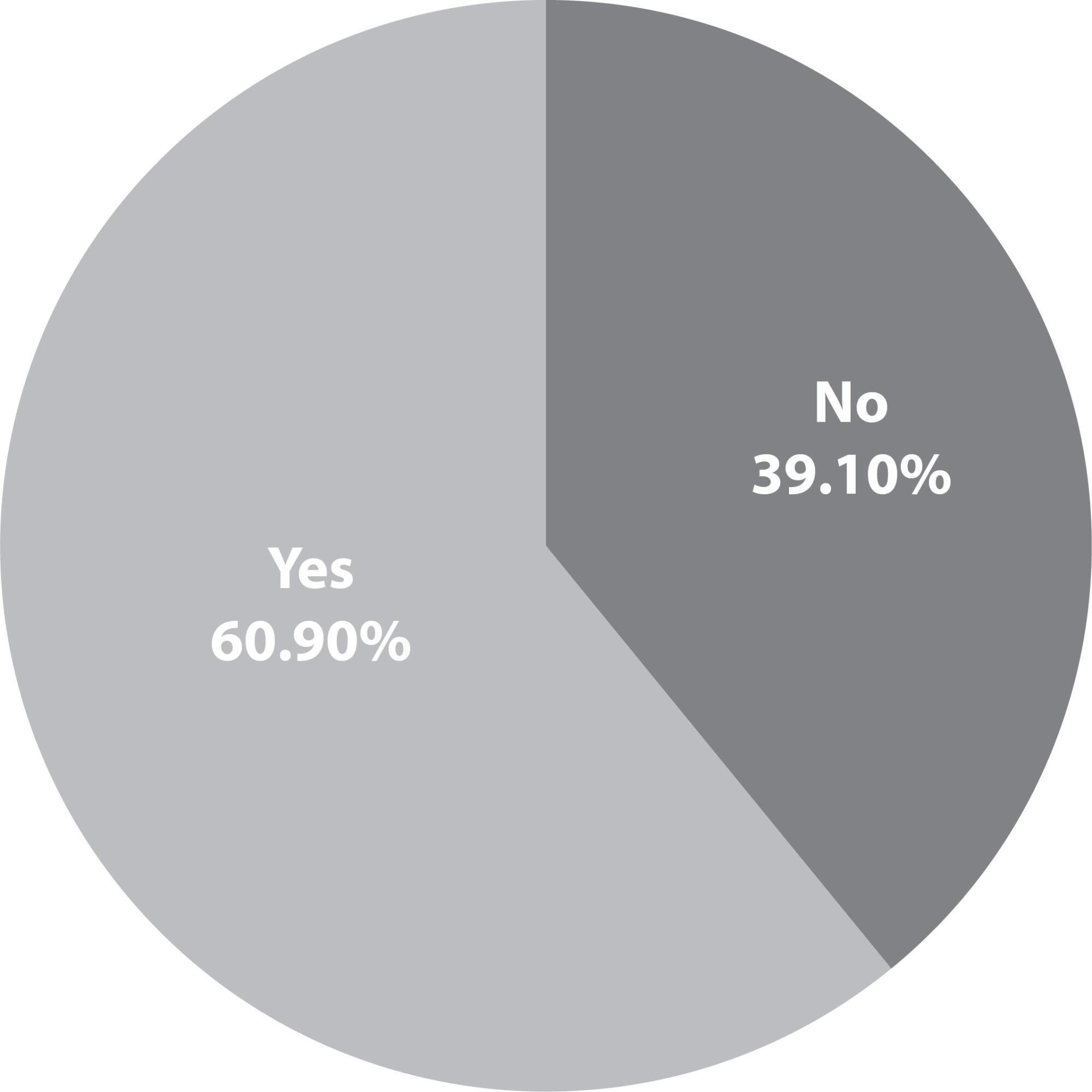
-
01-20-2021
Burnout Syndrome and Associated Factors in Intensive Care Unit Nurses
Revista Brasileira de Enfermagem. 2021;74:e20190535
Abstract
Burnout Syndrome and Associated Factors in Intensive Care Unit Nurses
Revista Brasileira de Enfermagem. 2021;74:e20190535
DOI 10.1590/0034-7167-2019-0535
Views0See moreABSTRACT
Objective:
to estimate prevalence and factors associated with Burnout Syndrome in intensive care nurses in a city in the state of Bahia.
Methods:
a cross-sectional, population-based study carried out with 65 intensive care nurses through a self-administered questionnaire, from July to November 2016, containing sociodemographic data, lifestyle, work characteristics. To define burnout syndrome, the Maslach Burnout Inventory was used.
Results:
Burnout Syndrome prevalence was 53.6%, an association was observed with age, tobacco consumption, alcohol use, weekly night shift hours, employment relationship, having an intensive care specialist title, number of patients on duty, monthly income and considering active or high-strain job.
Conclusion:
the results of this study can contribute to expanding the discussion on stressful working conditions in Intensive Care Units.
-
ORIGINAL ARTICLE12-05-2019
Elderly caregivers of the elderly: frailty, loneliness and depressive symptoms
Revista Brasileira de Enfermagem. 2019;72:88-96
Abstract
ORIGINAL ARTICLEElderly caregivers of the elderly: frailty, loneliness and depressive symptoms
Revista Brasileira de Enfermagem. 2019;72:88-96
DOI 10.1590/0034-7167-2018-0137
Views0See moreABSTRACT
Objective:
to investigate the association between frailty, loneliness and depressive symptoms of elderly caregivers.
Method:
a cross – sectional study carried out with 341 elderly caregivers enrolled in Family Health Units of a city in the countryside of São Paulo State. The interviews were domiciliary and included questionnaire for characterization of the caregiver, Fried’s frailty phenotype, family APGAR (family functionality), Geriatric Depression Scale (depressive symptoms) and item 3 of the Herth Hope Scale (loneliness). Logistic regression was used to analyze the association between depressive symptoms and solitude (independent variables), and frailty and pre-frailty (dependent variables).
Results:
there was an association between frailty, loneliness and depressive symptoms. Elderly caregivers had increased odds of 158% presenting pre-frailty, and 360% of frailty. Elderly caregivers with depressive symptoms had an increased chance of 242% of presenting fragility.
Conclusion:
elderly and lonely caregivers with depressive symptoms are more likely to be frail and pre-frail.
-
08-19-2019
Clinical simulation in nursing education in intensive therapy: an integrative review
Revista Brasileira de Enfermagem. 2019;72(4):1061-1070
Abstract
Clinical simulation in nursing education in intensive therapy: an integrative review
Revista Brasileira de Enfermagem. 2019;72(4):1061-1070
DOI 10.1590/0034-7167-2018-0217
Views0See moreABSTRACT
Objective:
to analyze the publications on clinical simulation practices for education in Nursing in Intensive Care.
Method:
an integrative review carried out through LILACS, PubMed, Cochrane Library, CINAHL and SciELO databases, of articles published from 2008 to 2017.
Results:
29 articles were selected, of which 76% discuss the use of simulation in continuing education of nursing professionals, while the others describe their use for student education. There is a higher prevalence of studies with a level of evidence 6 (17), with 28 international publications. There was an increase in scientific production, with 16 articles published in the last three years.
Conclusion:
variables after simulation use, such as confidence, communication skills, efficiency in the identification of clinical worsening of patients, development of technical skills, teamwork and clinical decision-making, presented a significant improvement, demonstrating that this tool is effective in qualifying care for critical patients.
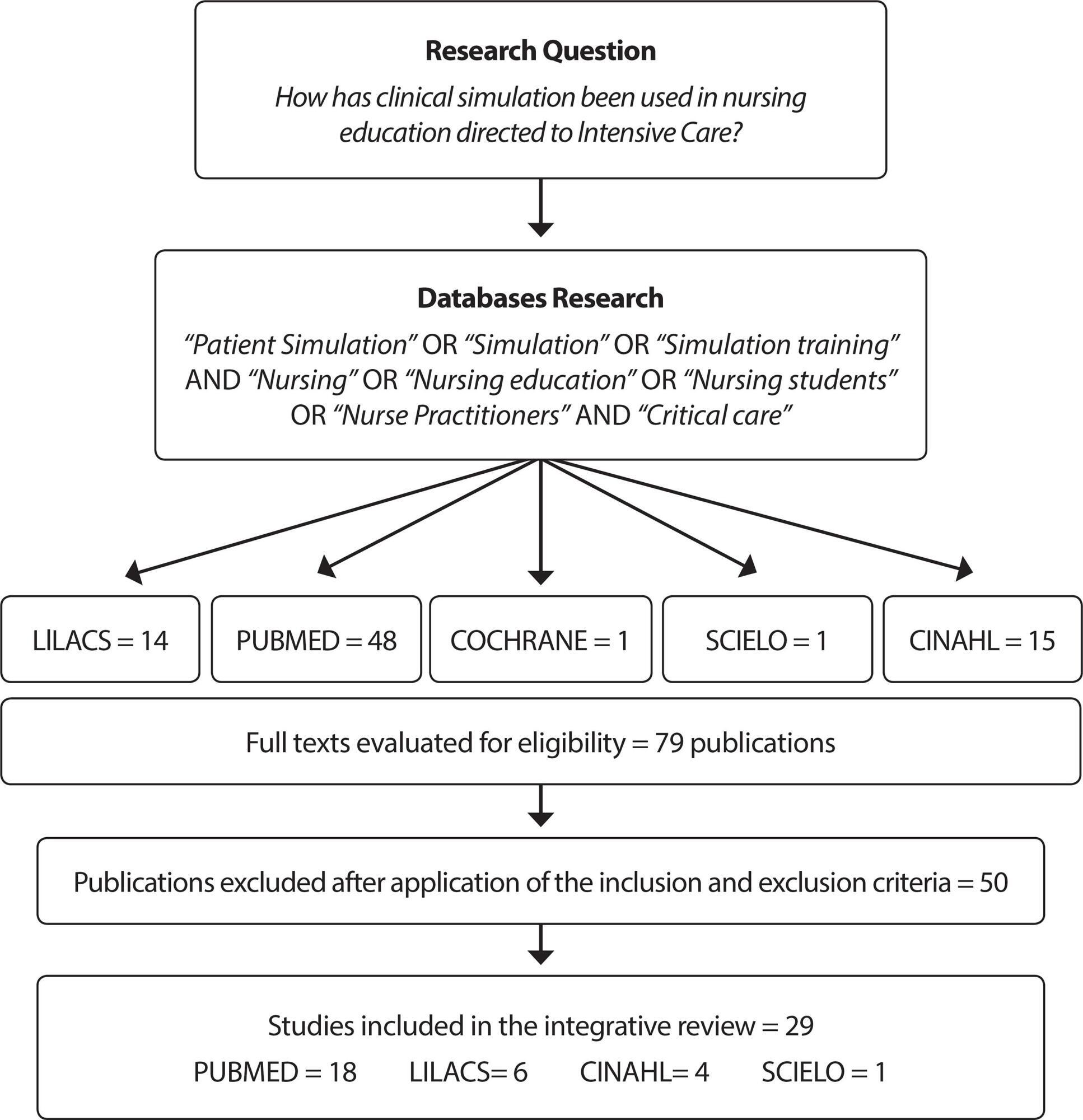
-
ORIGINAL ARTICLE06-08-2020
Usability of a mobile application on diabetic foot self-care
Revista Brasileira de Enfermagem. 2020;73(4):e20180862
Abstract
ORIGINAL ARTICLEUsability of a mobile application on diabetic foot self-care
Revista Brasileira de Enfermagem. 2020;73(4):e20180862
DOI 10.1590/0034-7167-2018-0862
Views0See moreABSTRACT
Objectives:
to assess the usability of an app prototype for diabetic foot self-care by an end user.
Methods:
a descriptive study that uses heuristic assessment of a hybrid app usability. Fifteen users of an outpatient diabetes care service in a capital of Northeastern Brazil participated in the study during April 2018. The usability measurement tool called Smartphone Usability questionnaiRE was applied.
Results:
the lowest score was 77 and the highest was 112, with an average usability of 96.1 points. Usability was framed in the last two levels, 70 and 8o. Users now strongly agree (level 70) and fully (level 80) with the assessed items, which represents good usability of the apps prototype.
Conclusions:
the final product developed focuses on user needs and requirements, which can ensure usability based on effectiveness, efficiency and satisfaction triad.
Search
Search in:
Nuvem de Tags
Adolescente (85) Atenção Primária à Saúde (239) COVID-19 (91) Criança (91) Cuidados de Enfermagem (269) Educação em Enfermagem (151) Educação em Saúde (139) Enfermagem (930) Enfermagem Pediátrica (86) Estudantes de Enfermagem (77) Estudos de Validação (131) Família (87) Idoso (208) Promoção da Saúde (99) Qualidade de Vida (104) Saúde do Trabalhador (86) Saúde Mental (145) Saúde Pública (82) Segurança do Paciente (150) Tecnologia Educacional (100)



